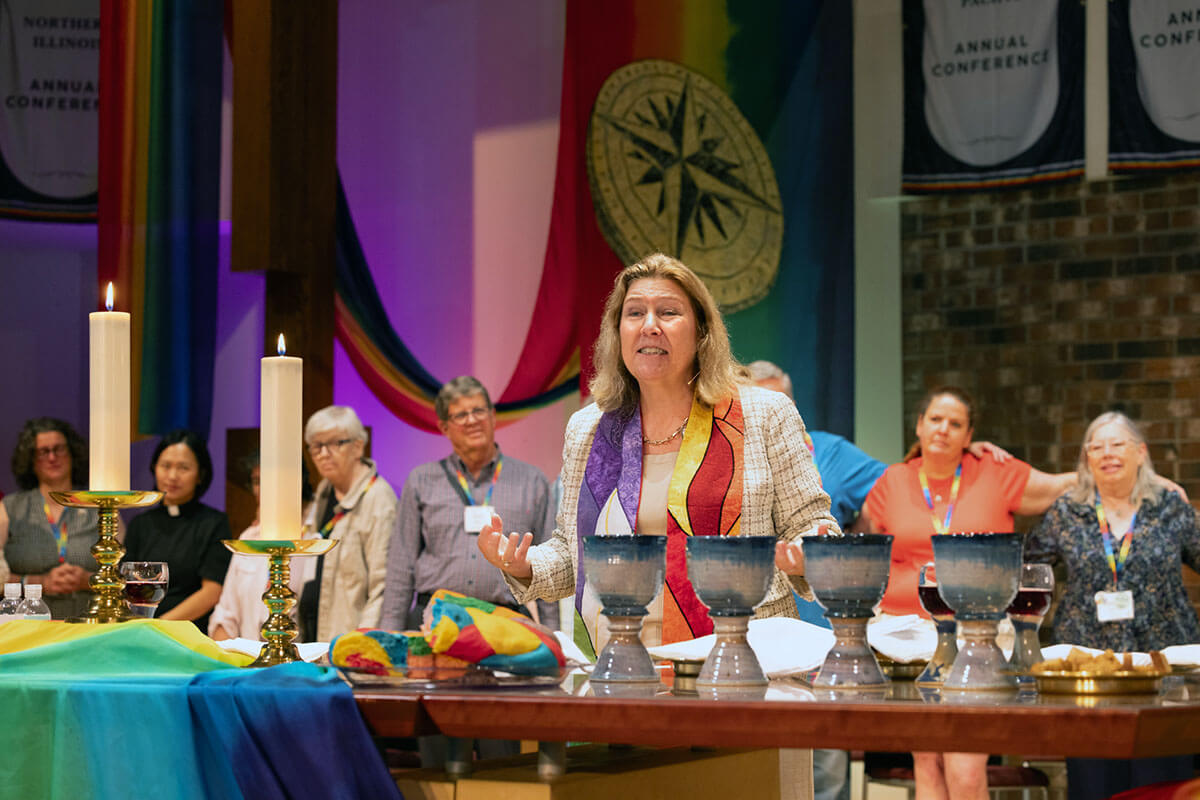Key Points:
- United Methodists gathered for the Reconciling Ministries Network’s first Convocation since last year’s momentous General Conference removed denomination-wide bans targeting LGBTQ people.
- Even with success at General Conference, the group’s message throughout the July 24-27 event was that the movement is still needed as the denomination rebuilds and addresses injustice around the globe.
- The gathering was filled with moments of celebration as well as recognition of the challenges ahead.
For Helen Ryde, The United Methodist Church’s removal of barriers to LGBTQ ministry was like when the walls of Jericho came tumbling down.
“Joshua only took seven days,” said Ryde, director of mission impact for the Reconciling Ministries Network. “We were marching around those walls for 50 years, right?”
Ryde acknowledged that the timeframe wasn’t the only notable difference between the Bible story and the effort to topple the denomination’s fortifications against LGBTQ inclusion.
“The truth is: We were always both inside the walls and outside the walls.”
Ryde was speaking to those gathered for the Reconciling Ministries Network’s July 24-27 Convocation at First United Methodist Church in downtown Madison, Wisconsin. More than 250 people, in person and online, attended the advocacy group’s first such gathering since last year’s General Conference brought a seismic shift in the international denomination.
After decades of internal strife and the heartbreak of church disaffiliations, the United Methodist legislative assembly last year voted overwhelmingly to remove denomination-wide bans on same-sex weddings, openly gay clergy and funding for ministry with LGBTQ people. Perhaps most significantly, General Conference delegates also eliminated an assertion — first approved by General Conference in 1972 — that called the practice of homosexuality “incompatible with Christian teaching.”
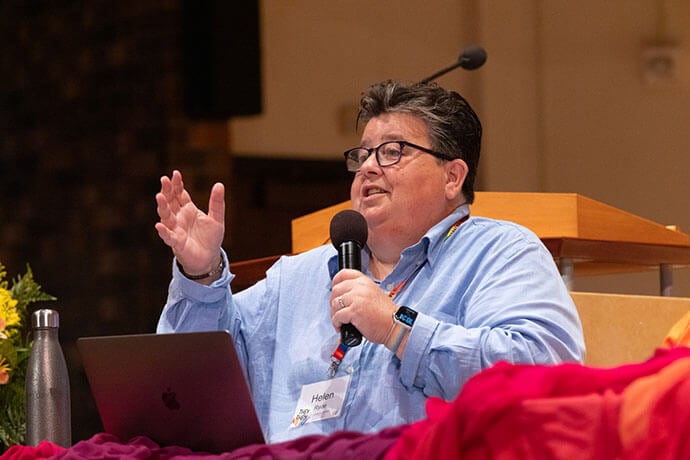
The 2025 Convocation, with the theme “Uncharted,” offered a time for advocates to celebrate and cooperate as they move into a new denominational landscape.
“I want to tell you that every reconciling United Methodist and every reconciling United Methodist ministry played a role in getting to this moment,” said Jan Lawrence, Reconciling Ministries Network’s executive director, in opening the Convocation.
The Reconciling movement began in 1984 with an initiative by another advocacy group, Affirmation, to build a network of United Methodist churches committed to full inclusion. Over the decades as successive General Conferences erected more barriers to LGBTQ people, the network’s growing membership kept praying and organizing with faith that God was leading the church into a new day.
Though that new day has now arrived, the Reconciling Ministries Network has no plans to close up shop. The group, which launched a new strategic plan this year, sees opportunities to work more closely with the denomination in rebuilding after church exits and supporting its justice work.
“The season of disaffiliation was and continues to be difficult. It not only divided congregations; it divided families,” Lawrence said. “And the rising violence and authoritarianism in the world around us has added work to justice seekers. But as the Reconciling movement and the Reconciling people in The United Methodist Church, we will keep showing up.”
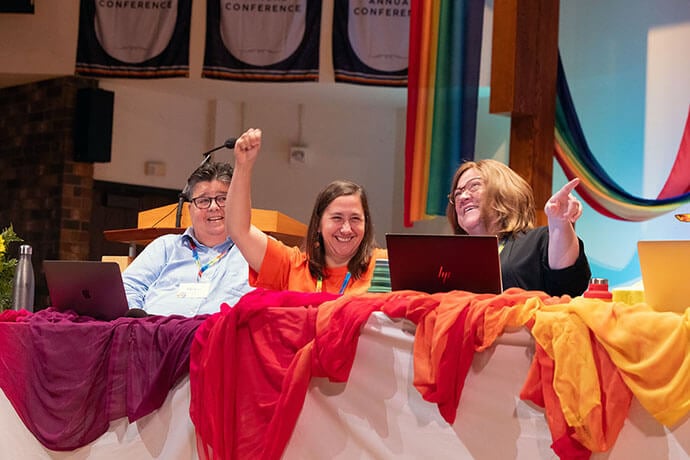
Unlike Joshua’s forces, the Reconciling Ministries Network and its allies never had the goal of destruction but expansion — helping the church share Christ’s love with more people.
“Our mission is to provide a space where every Christ follower discovers who they are and can be who they are in The United Methodist Church in all of the fullness of what that means,” said the Rev. David Meredith, a retired United Methodist pastor in the West Ohio Conference and the group’s board chair.
Emblematic of the denomination’s greater openness, he spoke under banners representing the Convocation’s sponsorship by 24 of the denomination’s 51 U.S. conferences. Other sponsors included general agencies and other United Methodist ministries who, under the earlier funding ban, could not offer such financial support.
Building international relationships
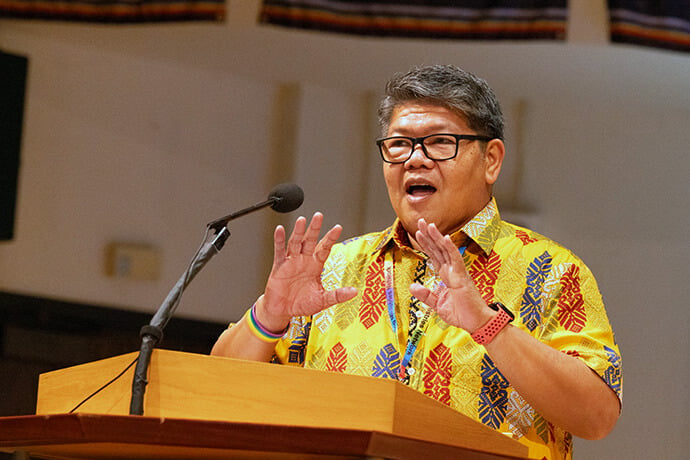
In another sign of how much things have changed, three bishops attended the Convocation. They included host Bishop Dan Schwerin of the Wisconsin and Northern Illinois conferences; Bishop Cedric Bridgeforth, the denomination’s first Black gay bishop and leader of three Greater Northwest conferences; and Mountain Sky Conference Bishop Kristin Stoneking, the denomination’s third gay bishop.
Council of Bishops President Tracy S. Malone, who leads the Indiana Conference, was unable to attend in person but sent video greetings.
United Methodist seminaries also were well represented among the sponsors. Bryan P. Stone, the new dean of Southern Methodist University’s Perkins School of Theology in Dallas, attended in person.
“I wanted to us to be present here, to communicate our passion and joy to work with LGBTQIA-plus persons as allies and as a school for whom that population is absolutely central to my vision for what theological education should be,” Stone said.
Also among the sponsors was Rainbow Tree: Korean Christians Welcoming LGBTQIA, a largely Korean American group that got started shortly after the 2019 General Conference passed the Traditional Plan — making the LGBTQ restrictions seem impenetrable.
“We realized that there were some assumptions that all Koreans are conservative and support the Traditional Plan,” said the Rev. Hyunwoong Hwang, a United Methodist pastor in Wisconsin. “So, we wanted to say there are some other Christians, Korean Christians, who support inclusive work.”
Yet, even as the denomination’s walls have fallen just as in Jericho of old, Ryde said pieces of the former barriers still block the way.
“That’s where we are,” said Ryde, who uses they/them pronouns. “We’ve got the walls down, but we’re still navigating the rubble on the ground. So, our job as we move forward is to get that rubble out of the way. There are some in the institution who are staying behind the rubble, pretending it’s still a wall.”
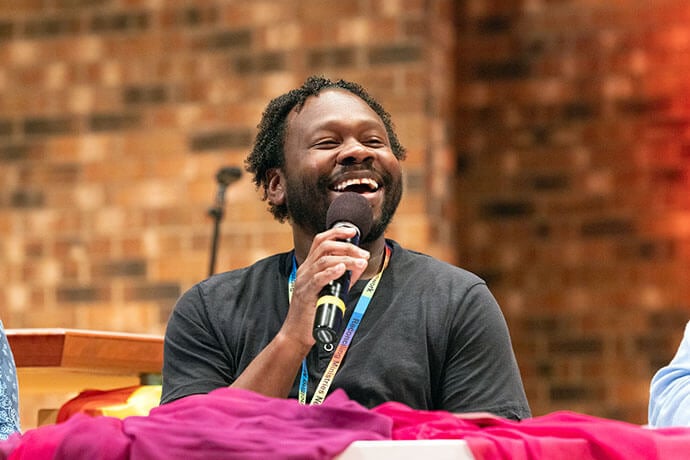
Laura Young, the network’s director of congregational engagement and resource development, said some bishops, conferences and churches are welcoming same-sex weddings and gay clergy. Still others are acting like nothing has changed at all.
She summed up the situation this way: “The changes that we achieved at General Conference removed mandated discrimination, but the option to discriminate is still very much there. The bottom line: Your level of inclusion is dependent on your ZIP code.”
She added that the struggles are not confined to the U.S. South.
Even as United Methodist churches become more hospitable, the U.S. and some state governments are becoming more hostile to people on the margins. Among those especially targeted are trans people, racial and ethnic minorities, immigrants and even people who simply are visiting the U.S.
The Rev. Valerie L. Jackson, chair of the network’s Equity Council, preached that one lesson from the first chapter of Exodus is that people can be free one day and enslaved the next.
“Our freedom and our liberation depend on who is in leadership,” said Jackson, senior pastor of Park Hill United Methodist Church in Denver. “Our freedom and our liberation depend on who is on the Council of Bishops, who our district superintendents are, who the lead pastors of our churches are. Our freedom and our liberation depend on who is in the Oval Office.”

For many at the Convocation, this was a time of both joy and trepidation for the challenges ahead.
Alice Williams, Florida Conference co-lay leader, said that because of the longtime advocacy of the Reconciling movement, she was able see the face of God in two moments this past year.
The first was the ordination of her openly gay friend, the Rev. Kip Nelson. The second was her own wedding to her beloved of 45 years inside a United Methodist church.
Taking inspiration from Ryde’s description of the rubble still around, Williams said that, in these days, Reconciling United Methodists need to be “the rubble-rousers.”
“We need to be the rubble-rousers that start to help people to understand, first, our presence. We cannot shrink,” said Williams, a network board member.
“The second piece is that we build the relationships that help people to understand and demystify what it means to be queer in this country and around the world. We also need to look for ways to insert ourselves in the conversation.”
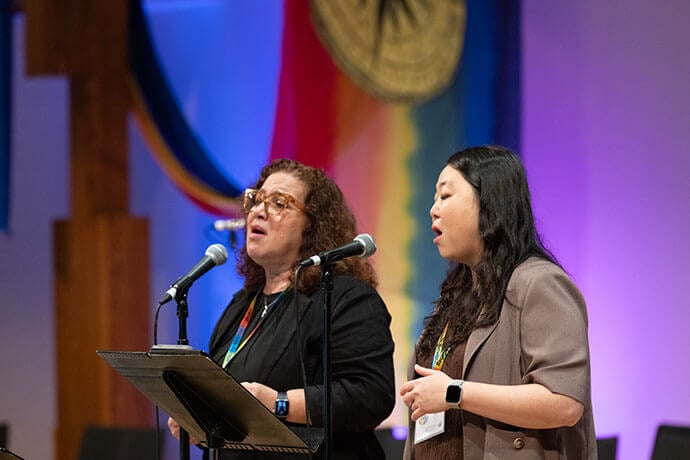
Bishop Stoneking, the first openly gay and married bishop elected since the elimination of the gay-clergy ban, preached July 27 at the Sunday service that doubled as the Convocation’s closing worship.
She preached on Acts 16:6-15, which describes how Paul and his companions struggled to figure out where God was sending them before a vision guided them to the imperial city of Philippi in Macedonia. There they met Lydia, the purple-cloth dealer who was baptized alongside her entire household.
Subscribe to our
e-newsletter
United Methodists in the Reconciling movement are similarly trying to discern God’s next steps, Stoneking said, and as happened with Paul and his companions, the Holy Spirit could lead them to an unknown and potentially dangerous place. But like the early evangelists, they also will likely make new friends along the way.
This was the first Convocation for more than half of the people in attendance.
“Let us move with the hope and faith of a people who have long labored for a cause and have seen it come to fruition — knowing that if it can happen once, it can happen again,” she said to applause.
“This is what we are called to do when suffering still exists. This is what hope sounds like when it won’t stay quiet. This is what love looks like when it moves in and infuses every place where love doesn’t yet reign. It says, ‘God sent us because God is still leading.’”
Hahn is assistant news editor for UM News. Contact her at (615) 742-5470 of [email protected]. To read more United Methodist news, subscribe to the free UM News Digest.

